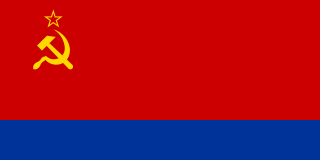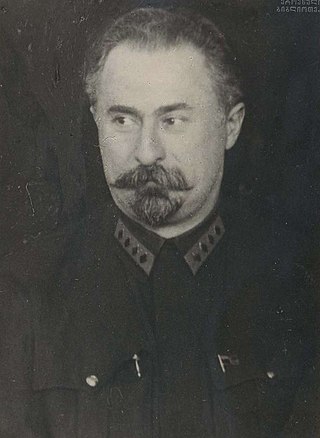| |||||
| Decades: | |||||
|---|---|---|---|---|---|
| See also: | |||||
The following lists events that happened during 1922 in the Union of Soviet Socialist Republics .
| |||||
| Decades: | |||||
|---|---|---|---|---|---|
| See also: | |||||
The following lists events that happened during 1922 in the Union of Soviet Socialist Republics .
Mass expulsions of intellectuals on the so-called Philosophers' ships and later by rail.

The Azerbaijan Soviet Socialist Republic, also referred to as the Azerbaijani Soviet Socialist Republic, Azerbaijan SSR, Azerbaijani SSR, AzSSR, Soviet Azerbaijan or simply Azerbaijan, was one of the constituent republics of the Soviet Union between 1922 and 1991. Created on 28 April 1920 when the Russian Soviet Federative Socialist Republic brought pro-Soviet figures to power in the region, the first two years of the Azerbaijani SSR were as an independent country until incorporation into the Transcausasian SFSR, along with the Armenian SSR and the Georgian SSR.
The 1924 Constitution of the Soviet Union was the constitution of the Soviet Union adopted on 31 January 1924. According to British historian Archie Brown the constitution was never an accurate guide to political reality in the USSR. For example, the fact that the Communist Party played the leading role in making and enforcing policy was not explicitly mentioned in it until 1977.

An index of articles related to the former nation known as the Soviet Union. It covers the Soviet revolutionary period until the dissolution of the Soviet Union. This list includes topics, events, persons and other items of national significance within the Soviet Union. It does not include places within the Soviet Union, unless the place is associated with an event of national significance. This index also does not contain items related to Soviet Military History.
A presidium or praesidium is a council of executive officers in some countries' political assemblies that collectively administers its business, either alongside an individual president or in place of one.

The political system of the Soviet Union took place in a federal single-party soviet socialist republic framework which was characterized by the superior role of the Communist Party of the Soviet Union (CPSU), the only party permitted by the Constitution.

Shalva Zurabovich Eliava was a Georgian Old Bolshevik and Soviet official who contributed to the Sovietization of Central Asia and Caucasus but fell victim to Joseph Stalin’s Great Purge.

The Russian Soviet Federative Socialist Republic, previously known as the Russian Soviet Republic and the Russian Socialist Federative Soviet Republic, as well as being unofficially referred to as Soviet Russia, the Russian Federation, or simply Russia, was an independent federal socialist state from 1917 to 1922, and afterwards the largest and most populous constituent republic of the Soviet Union (USSR) from 1922 to 1991, until becoming a sovereign part of the Soviet Union with priority of Russian laws over Union-level legislation in 1990 and 1991, the last two years of the existence of the USSR. The Russian SFSR was composed of sixteen smaller constituent units of autonomous republics, five autonomous oblasts, ten autonomous okrugs, six krais and forty oblasts. Russians formed the largest ethnic group. The capital of the Russian SFSR and the USSR as a whole was Moscow and the other major urban centers included Leningrad, Stalingrad, Novosibirsk, Sverdlovsk, Gorky and Kuybyshev. It was the first socialist state in the world.

The Government of the Union of Soviet Socialist Republics (USSR) was the executive and administrative organ of the highest body of state authority, the All-Union Supreme Soviet. It was formed on 30 December 1922 and abolished on 26 December 1991. The government was headed by a chairman, most commonly referred to as the premier of the Soviet Union, and several deputy chairmen throughout its existence. The Communist Party of the Soviet Union (CPSU), as "The leading and guiding force of Soviet society and the nucleus of its political system" per Article 6 of the state constitution, controlled the government by holding a two-thirds majority in the All-Union Supreme Soviet. The government underwent several name changes throughout its history, and was known as the Council of People's Commissars from 1922 to 1946, the Council of Ministers from 1946 to 1991, the Cabinet of Ministers from January to August 1991 and the Committee on the Operational Management of the National Economy from August to December 1991.

The Central Executive Committeeof the USSR, which may be abbreviated as the CEC, was the supreme governing body of the USSR in between sessions of the All-Union Congress of Soviets from 1922 to 1938. The Central Executive Committee elected the Presidium, which, like its parent body, was delegated governing authority when the other was not in session. The chairman of the Presidium, served as the ceremonial head of state of the USSR. The Central Executive Committee also elected the Council of People's Commissars which was its executive and administrative organ. The Central Executive Committee of the USSR was established in 1922 by the First All-Union Congress of Soviets, and was replaced by the Presidium of the Supreme Soviet in 1938.

The All-Union Congress of Soviets was formally the supreme governing body of the Soviet Union from its formation until the adoption of its second constitution in 1936. The Congress of Soviets determined the general direction of all public bodies and elected the Central Executive Committee of the Soviet Union: a body which was accountable to, and held the powers of the Congress when the Congress was not in session. Despite its nominal authority, in practice the Congress served as a rubber-stamp for the Communist Party. With the 1936 Constitution, the All-Union Congress was replaced by the Supreme Soviet.

The All-Russian Congress of Soviets evolved from 1917 to become the supreme governing body of the Russian Soviet Federative Socialist Republic from 1918 until 1936, effectively. The 1918 Constitution of the Russian SFSR mandated that Congress shall convene at least twice a year, with the duties of defining the principles of the Soviet Constitution and ratifying peace treaties. The October Revolution ousted the provisional government of 1917, making the Congress of Soviets the sole, and supreme governing body. This Congress was not the same as the Congress of Soviets of the Soviet Union which governed the whole Soviet Union after its creation in 1922.
The following lists events that happened during 1986 in the Union of Soviet Socialist Republics.

The Declaration and Treaty on the Formation of the Union of Soviet Socialist Republics officially created the Union of Soviet Socialist Republics (USSR), commonly known as the Soviet Union. It de jure legalised a political union of several Soviet republics that had existed since 1919 and created a new federal government whose key functions were centralised in Moscow. Its legislative branch consisted of the Congress of Soviets of the Soviet Union and the Central Executive Committee of the Soviet Union (TsIK), while the Council of People's Commissars composed the executive.

The Council of People's Commissars (CPC) (Russian: Совет народных комиссаров (СНК), romanized: Sovet narodnykh kommissarov (SNK)), commonly known as the Sovnarkom (Совнарком), were the highest executive authorities of the Russian Soviet Federative Socialist Republic (RSFSR), the Soviet Union (USSR), and the Soviet republics from 1917 to 1946.
The following lists events that happened during 1923 in the Union of Soviet Socialist Republics.
The following lists events that happened during 1924 in the Union of Soviet Socialist Republics.
The following lists events that happened during 1925 in the Union of Soviet Socialist Republics.

The First All-Union Congress of Soviets was a congress of representatives of Soviets of workers, peasants and Red Army deputies, held on December 30, 1922 in Moscow. The congress was attended by 2215 delegates. Kalinin was elected chairman of the congress, but Vladimir Lenin, who was not present at the congress due to illness, was elected honorary chairman of the congress. More than 90% of the delegates were members of the Russian Communist Party, 2 left-wing social federalists of the Caucasus, 1 anarchist and 1 member of the Jewish Social Democratic Party.